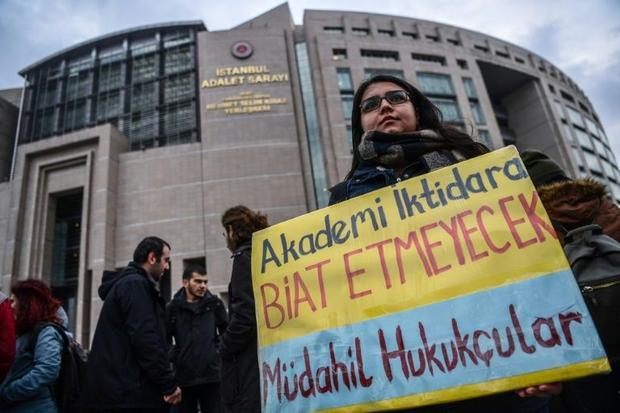Turkey Trying Academics for Peace Declaration
Hundreds of Turkish academics face trial over signing a peace declaration that called for end of military operations against outlawed Kurdish militants in urban centers, citing soaring civilian casualties and destruction of residential areas.
Turkey this week began the hugely controversial trial of a group of academics charged with terror offenses for signing a petition calling for peace in the Kurdish-dominated southeast.
Over 1,120 Turkish and also foreign academics signed the petition which emerged in January 2016, calling for an end to the military’s crackdown on outlawed Kurdish militants in the southeast that had begun six months earlier.
The academics say the petition was an apolitical call for peace, but prosecutors charged 146 of the signatories with making propaganda for the outlawed Kurdistan Workers Party (PKK).
The first 10 — from Istanbul University and Galatasaray University — went on trial in Istanbul on Tuesday with the hearing attended by EU diplomats including the French ambassador.
Each suspect had a 10-minute hearing at the start of a marathon process expected to continue until at least April. The prosecution has chosen not to stage a mass trial involving all the suspects in the same case.
In the first hearings, the defense argued that the petition was “within boundaries of freedom of expression” and demanded their immediate acquittal, an AFP journalist in the court said.
Their next hearings will take place on April 12. Ten more academics will appear in court on Thursday with further sessions scheduled throughout December and January.
Outside the court, students gathered in support of their lecturers, brandishing banners with slogans, including: “Don’t touch my professor!”
‘Shocking miscarriage of justice’
If convicted, the suspects face up to seven-and-a-half years in jail. None of those who went on trial on Tuesday is currently being held behind bars.
Professor Ibrahim Kaboglu, whose hearing is set for December 21, called the trial an “absurdity.”
“It’s a paradoxical dilemma. There’s no logic. It cannot be justified legally,” said Mr. Kaboglu, who lost his job after signing the petition.
“The trial is rooted in freedom of expression, which is a crucial problem for Turkey,” he told AFP.
Renowned U.S. philosopher and linguist Noam Chomsky, who also signed the petition, issued a statement in solidarity with the Turkish scholars, criticizing the penal case as a “shocking miscarriage of justice.”
“The case is an assault against fundamental rights of free expression that should be zealously safeguarded,” the leftwing academic said in a message.
France said it was monitoring the case with “great attention,” calling on Turkey to respect its commitments on human rights and fundamental freedoms.
“Respect for the right to a fair trial and the promotion of an active and pluralistic civil society are essential components of any democracy,” the French foreign ministry said in a statement.
It emphasized France’s support for Galatasaray University — set up in 1992 under a Turkish-French agreement — hailing it as an “essential pillar of French-Turkish cooperation.”
‘Deliberate, planned massacre’
Turkey’s latest campaign against the PKK has been backed by heavy ground offensives the government says are necessary to crush a terror group but activists say the operation has been marked by disregard for civilian lives.
The petition denounced a “deliberate and planned massacre” in the southeast, which it said was “in serious violation of international law.”
Erdogan sharply criticised the signatories, saying they were “party to” the bloodshed being carried out by the PKK, and invited his foreign critics, including Mr. Chomsky, to come see the situation for themselves.
But Human Rights Watch on Tuesday said the trials violated the right to freedom of speech and were a “misuse of terrorism laws.”
The prosecution claims that the academics were responding to a call from a senior PKK figure for intellectuals to support the Kurdish militant cause.
The trials opened to the backdrop of growing concern over freedom of expression in Turkey following a massive crackdown in the wake of the failed coup of July 2016 against Mr. Erdogan’s rule.
Since then, thousands of employees in the education sector have been dismissed under laws linked to the state of emergency, among them 463 of the academics who signed the petition, HRW said.




Comments are closed.